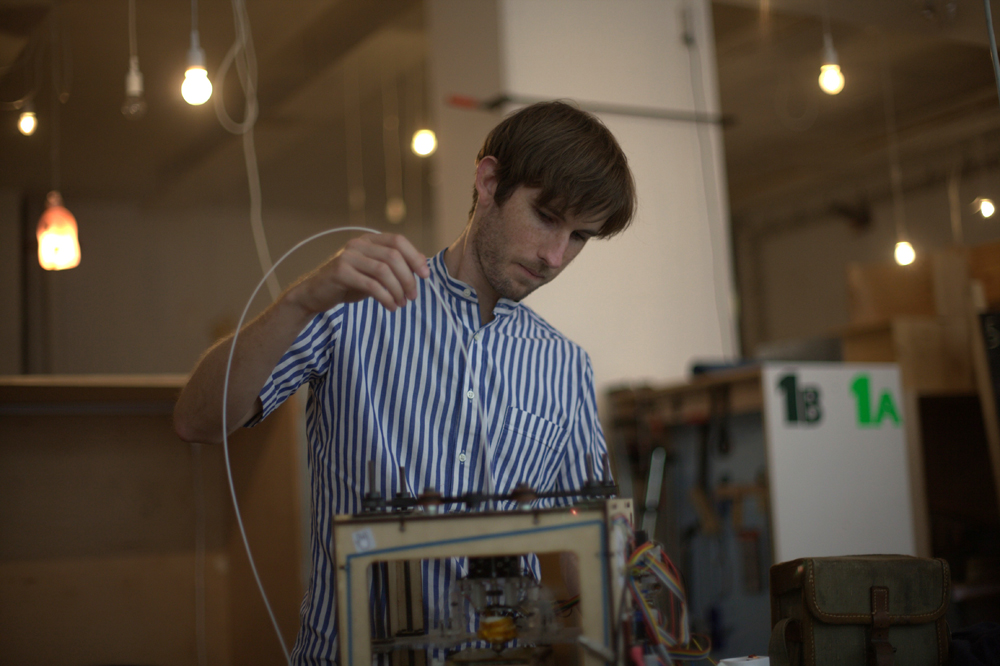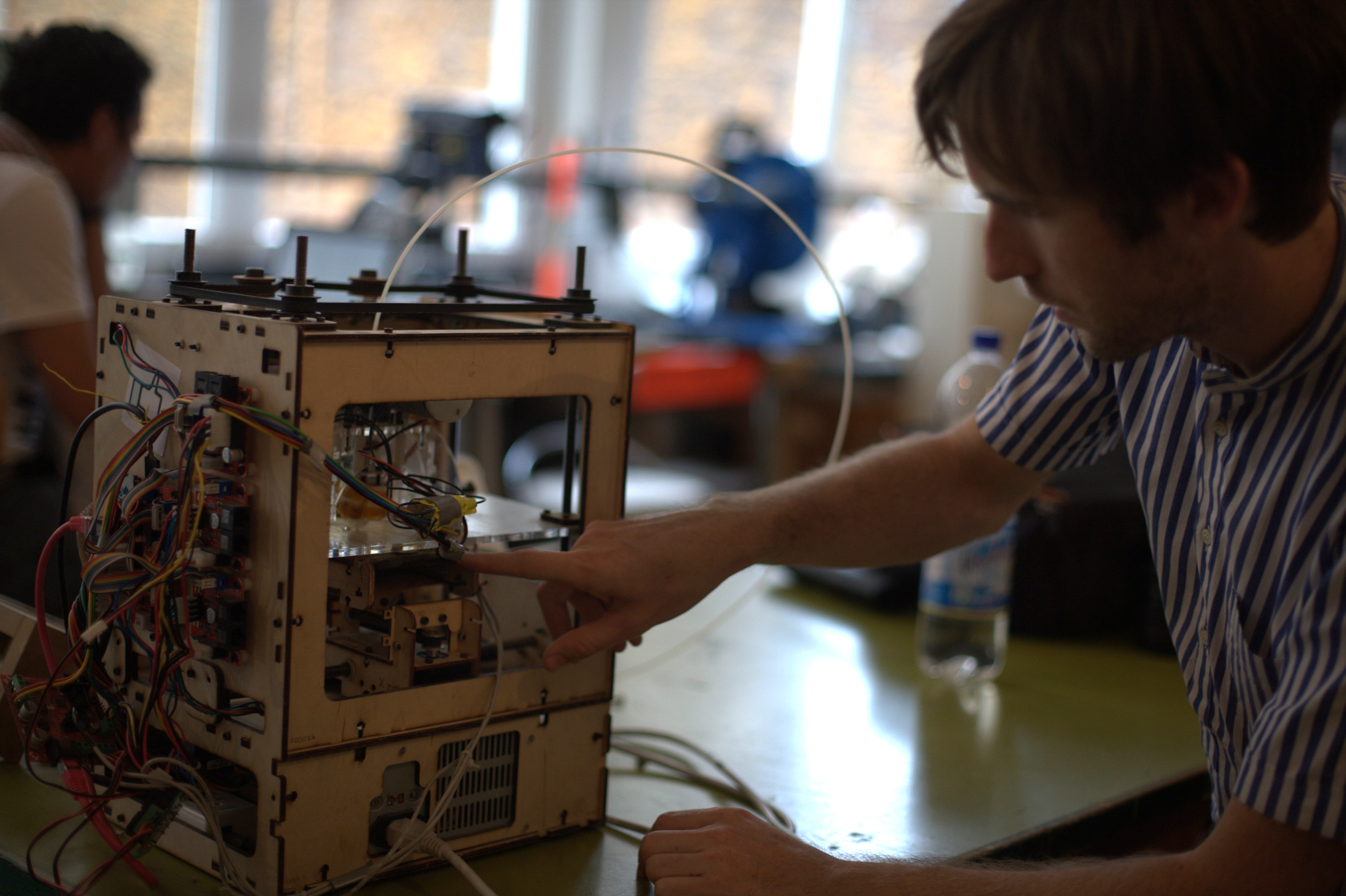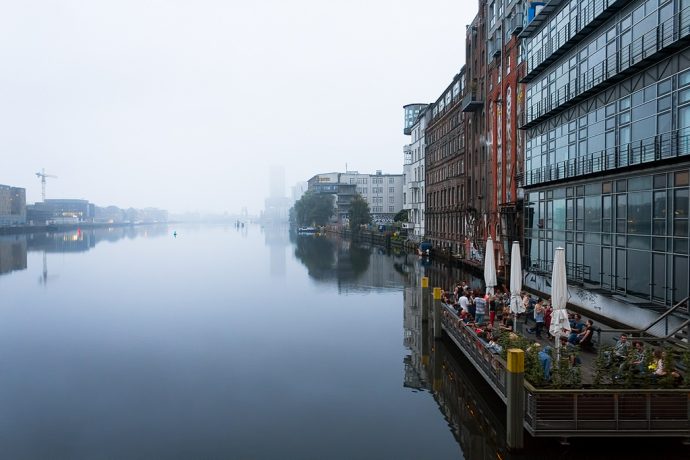Year of Open Source

Multinationals, corporations, “the man”. Unless you live a hermetic existence, atop a mountain (in which case, you’re probably not reading this), you are no stranger to the world of Coca-Cola & copyright. Technology has made the world smaller, yet the gap between rich & poor, the proprietary & the free, is widening. Sam Muirhead is a filmmaker doing his best to live a freer, more “open source” life.
We live in a contrary world. In our post-industrial era, knowledge is arguably more democratised thanks to the internet and the devices on which we explore it. Yet, just like our global sphere, our online lives contain certain empires; grey-areas governed by Google, Apple and Facebook. Berlin-based filmmaker and free-thinker, Sam Muirhead, is doing his best to investigate what it feels, tastes and smells like to live at once within and outside “the system”, through his Year of Open Source project. From 1 August 2012 – 1 August 2013, Sam will eschew “traditionally copyrighted” products (almost anything you can think of!) in favour of “open source” clothing, communications, food and transport. Just what is this “open source”, you say? Well, as Sam explained to his mum: “The basic idea behind open source is transparency, allowing modification and access to a product. Cooking recipes are a good example of something that already is, and always has been, open source – nobody can copyright a recipe, and nobody can stop me from adapting that recipe to my own needs and posting it on the internet, publishing it in a book and so on.” So while the recipe for Coca-Cola is kept under lock and key, OpenCola, publishes its recipe, encouraging others to make, adapt, and brew their own colas. From his hacked “Frankenbook Pro”, Sam talked us through his philosophy of freedom so far…
There’s a playfulness about your project, an acknowledgment of the high probability of failure – after all, how can we live completely propriety-free in a globalised world? Have you maintained a fairly level head or have there been occasional bouts of despair when you are forced to compromise?
I live as part of a city, part of society and part of economic and political systems that have many proprietary elements. It might be possible to live entirely without proprietary influence if you lived somewhere in the wilderness, catching newts and wearing a loincloth. But you wouldn’t be able to say much about open source in that situation. The main goal of my project is not “to live without proprietary influence”, it is to present and explore the ideas of the open source movement. These ideas aren’t being developed for newt-catching. They’re developed for the modern world, so if I want to investigate them, that’s where I have to live. So there is plenty of compromise, yes. Sometimes that might just be that I don’t have the time, money, or ability to develop my own open source computer CPU, sometimes it might mean using an interesting product which is ‘mostly’ open source but is made using some proprietary elements. For me the key is acknowledging these struggles, being clear and honest about the limitations I come across. Sometimes, despite my best intentions, it just doesn’t work. But that doesn’t invalidate the whole project.

You’re originally from Auckland – how did you end up in Berlin?
I come from a small, young, basically monolingual country on the edge of the world. But, I have a European passport (British parents) and an interest in languages and history, so I wanted to move somewhere in mainland Europe. I had a bit of a detour along the way and Judith [Sam’s girlfriend] and I did some travel around South America. While we were there, a Kiwi friend of ours, based in Berlin, emailed us, telling us how amazing the city was, discussing the possibilities for interesting film and artistic projects. I had kind of forgotten that before I was working in video, I had studied German language and history in New Zealand for many years, so perhaps here was one of those rare opportunities to get some use out of a BA.
What is it about Berlin that makes it conducive to open source? Can you imagine attempting this project in any other city?
I see the open source scene as growing from the artistic and tech communities here. Just speaking economically, Berlin is cheap, as far as rent and food goes. But that doesn’t mean life is easy. The city is in a lot of debt, unemployment is 12.9%, and there’s no minimum wage. The low cost of living makes it appeal to startups, which are often in development without much income, for long periods, and also artists, who don’t bring in much money either. But Berlin is also the capital of one of the richest countries in the world, it’s home to a lot of very rich individuals and companies, and is a key centre of the EU. So for all those startups and artists, there’s a pretty juicy carrot in terms of startup incubators, and national, EU and private funds available for tech and the arts. Combine these purely economic reasons with the radical, open and artistic history and culture of Berlin and you get a lot of people who think differently, critically, and who have the time, technical skills or the ingenuity to put together interesting projects. People save money and find community by working in co-working spaces and hackspaces, and this tends to encourage openness, collaboration and sharing of ideas. There are many other cities with strong, distinct open source scenes, particularly in North America, but Berlin really has so much going on in open source, whether it be software, hardware, politics, education… here you have a wider mixing of cultures and approaches.
For those not so au fait with these terms or concepts, give us a potted definition of “open source” and “Creative Commons”…
When I talk about open source, I’m reluctantly using an imperfect term. It’s a phrase cooked up in the late ’90s to make the idealistic Free Software movement more palatable to business, but it’s also the most well-known and widespread term for this idea. Free Software is the philosophic basis for all the areas I’m looking into, and “Free” stands for “Freedom” – it’s about allowing the user of a product or project the freedom to use, study, understand, adapt, modify, share, reinvent, or sell that product. It does not mean free of cost – the classic explanation is “free as in speech, not as in beer”. That means being able to see how a product is put together, how it works, and not restricting further use of that product through copyright, patent or other protection.
Open source does not mean “without copyright”. The copyright is retained, but a different licensing structure is used to ensure the user’s freedom. Many projects use a “copyleft” license – this means that the user is free to adapt and modify the copyrighted product, with one restriction: if they republish the modified work, it must also be under the same copyleft license. For books, music, movies, there is the possibility to license works under Creative Commons (copyright with “some rights reserved” rather than “all rights reserved”). It gives the author more flexibility and more control over exactly how they wish their work to be used. The reason I use the term “open source” for my project is because it’s not just about free software, which has been so well documented already. I’m focused on how the ideas of free software have spread into other areas, whether that be “libre” or open hardware, open data, Creative Commons licensing, free culture, collaborative consumption, distributed networks, or open education.

You’ve created an open source swimwear calendar, illustrated by Judith. Tell us about your key open source inspirations…
Yochai Benkler’s The Wealth of Networks was the book that made clear to me the usefulness, efficiency and potential of this more open and collaborative way of working, and the great opportunity that the internet and modern technology has given us to make the world work better, fairer, and more sustainable. Marcin Jakubowski’s Open Source Ecology project is an awe-inspiring, fantastic project that everybody should know about and support. It’s one of those rare examples of a wildly idealistic target being approached through practical, sustainable and logical steps. I haven’t quite figured out how to do this with my project yet, so it’s important to look at successful approaches and learn from them. Mitchell Baker and Limor Fried, as well as having led and grown their organisations to become great examples of successful open source business models, are also very welcome examples of high-profile, inspirational women changing the traditional “boy’s club” of open source. What is wonderful to see is that although open source software is still very gender unbalanced, women have been playing a much greater role in the younger movement of open hardware.


I read that Year of Open Source was partly inspired by the local political/hacker/maker community. Tell us more about the initial spark for the project…
The Pirate Party is one part of it, but there’s so much more. I live in Kreuzberg, a dead-end corner of West Berlin that was jammed up against the Wall, where an incredible culture of protest, self-organisation and squatting grew up in a neighbourhood of students, anarchists, workers and immigrants over the ’70s and ’80s. This effect can still be seen in modern Kreuzberg – the institutions these people put together to help each other are still there: bike workshops, women’s centres, community education, tenant’s organisations, addiction centres. The Wall’s gone now, and Kreuzberg is no longer on the edge of a city, it’s in the centre. But this sense of standing up to authority and communities solving their own problems still resonates in Berlin now. I saw a link between this local history and the current developments of hackerspaces, co-working, collaboration and modern self-organisation and wanted to tell people about it. I was also fascinated by the philosophy and logic behind open source but didn’t feel I could really contribute as I wasn’t a hacker or an engineer or anything like that. Using my experiences as a thread seemed a good way to tell some of these stories.

You’re halfway through your “Year”. How has your day-to-day life transformed?
To be honest, the actual lifestyle hasn’t changed much. When the toothpaste runs low, you make some more. You want to watch a movie online? How about Buster Keaton, that’s public domain? I’m really missing travelling on the U-Bahn; I’m waiting for the Berlin transport authority to open their data. Until then, I’m still riding my bike in sub-zero temperatures. What has changed a lot is the intensity of filming and making videos, writing blog posts, doing interviews, presentations, and the general day-to-day of maintaining a website, planning future projects. With previous documentaries it was always a lot calmer, or at least there was a crew to share all these tasks.

What has the response to your project been thus far? From your friends, your community, your neighbourhood, Judith, your mum, internationally?
Most people seem to like the idea, or they’re at least curious. My friends are supportive of it and have adapted to my new lifestyle – they don’t call me up to go to the movies anymore, but table tennis is still non-proprietary, so I’m getting better at my topspin.
How do you balance the need to make a living with your commitment to open source?
“Balance” is not the right word. “Chaos” or “panic” come closer! I still make videos part-time to pay the rent – company image videos, crowdfunding campaign videos, and so on. But only for open organisations – I want to keep my output CC-BY-SA as much as possible, and all my post-production is done with free software. These videos take up a huge amount of my time, and so it’s a bit hectic trying to squeeze everything in.
What were your film projects like prior to this?
I didn’t study film, I learned how to edit whilst volunteering at a music TV station in 2005 – there was a show to go out, no editor, and someone handed me the Final Cut Pro manual (not a good way to learn editing). Since arriving in Berlin I’ve been shooting and editing with a documentary collective called Wrangelfilm – most of our work has been character studies or music documentary, though we’re editing a narrative film at the moment as well.
It’s hard to second-guess, but how will your creative projects shift once your year is up? Can you see a lasting impact on your filmmaking and living?
Originally I had expected to tell this story just through a series of short videos, appearing every couple of weeks, slowly unraveling the story of open source and sharing what I learn, as I learn. But storytelling doesn’t really work like that. You really need a logical narrative structure. You need to build on what the audience already knows, and not jump ahead and leap from subject to subject. And it’s difficult for me to explain a complex issue to an audience if I don’t even understand it yet. So there’s been a bit of a change of plan. The short videos, the interviews, the blog posts, they will all continue as a freeform research project, it might be a little all over the place but that’s kind of how life is. Come August 1st, the project comes to an end – I might go on a “proprietary bender” for a few days, you know, go to Disneyland and buy an iPhone, but then I’ll sit down and write a coherent, structured script to tell this story in an interesting and entertaining way. In terms of my future filmmaking, I’m not going back to Apple or Final Cut Pro, and I’m sticking with the Creative Commons-Attribution-Sharealike license. Throughout this year I’m finding more and more interesting projects in this field which I’d like to work with in some way, so I think I’m going to be hanging around the open source scene for a while longer yet.
What is the main thing you’d like followers of the project and the general public to take away from your project?
Take notice of open source, take it seriously, and get involved. As an idea, it’s practical, logical, efficient and ethical. And as a reality, it’s getting bigger and better all the time.

For more information, to support and to have a sneak peek at Judith’s open source pin-ups, visit Sam’s Year of Open Source. Or, click on the following links to find out more about open source, Creative Commons and copyleft licensing.